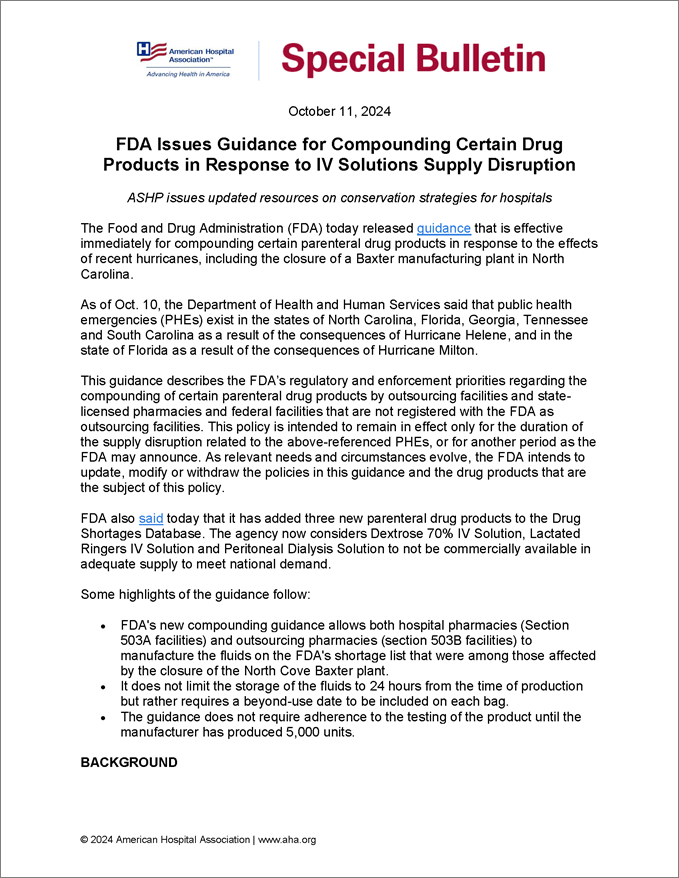FDA Issues Guidance for Compounding Certain Drug Products in Response to IV Solutions Supply Disruption
AHA Special Bulletin
October 11, 2024
ASHP issues updated resources on conservation strategies for hospitals
The Food and Drug Administration (FDA) today released guidance that is effective immediately for compounding certain parenteral drug products in response to the effects of recent hurricanes, including the closure of a Baxter manufacturing plant in North Carolina.
As of Oct. 10, the Department of Health and Human Services said that public health emergencies (PHEs) exist in the states of North Carolina, Florida, Georgia, Tennessee and South Carolina as a result of the consequences of Hurricane Helene, and in the state of Florida as a result of the consequences of Hurricane Milton.
This guidance describes the FDA’s regulatory and enforcement priorities regarding the compounding of certain parenteral drug products by outsourcing facilities and state licensed pharmacies and federal facilities that are not registered with the FDA as outsourcing facilities. This policy is intended to remain in effect only for the duration of the supply disruption related to the above-referenced PHEs, or for another period as the FDA may announce. As relevant needs and circumstances evolve, the FDA intends to update, modify or withdraw the policies in this guidance and the drug products that are the subject of this policy.
FDA also said today that it has added three new parenteral drug products to the Drug Shortages Database. The agency now considers Dextrose 70% IV Solution, Lactated Ringers IV Solution and Peritoneal Dialysis Solution to not be commercially available in adequate supply to meet national demand.
Some highlights of the guidance follow:
- FDA's new compounding guidance allows both hospital pharmacies (Section 503A facilities) and outsourcing pharmacies (section 503B facilities) to manufacture the fluids on the FDA's shortage list that were among those affected by the closure of the North Cove Baxter plant.
- It does not limit the storage of the fluids to 24 hours from the time of production but rather requires a beyond-use date to be included on each bag.
- The guidance does not require adherence to the testing of the product until the manufacturer has produced 5,000 units.
BACKGROUND
The AHA is continuing efforts on multiple fronts to provide updates and assist members related to the supply chain issues resulting from the closure of a Baxter manufacturing plant in North Carolina because of damage from Hurricane Helene. The plant manufactures approximately 60% — or 1.5 million bags — of the IV solutions used every day in the U.S.
UPDATED CONSERVATION RESOURCES AND QUESTIONS
Please visit our webpage for more information and resources on this situation. On the webpage, you will find resources on conservation strategies, including a resource from ASHP that was updated today for managing fluid shortages and conserving supply. If you have further questions, please contact Nancy Foster, vice president for quality and patient safety policy, at nfoster@aha.org, or Roslyne Schulman, director of policy at rschulman@aha.org.


